Week ahead in Parliament
- Published
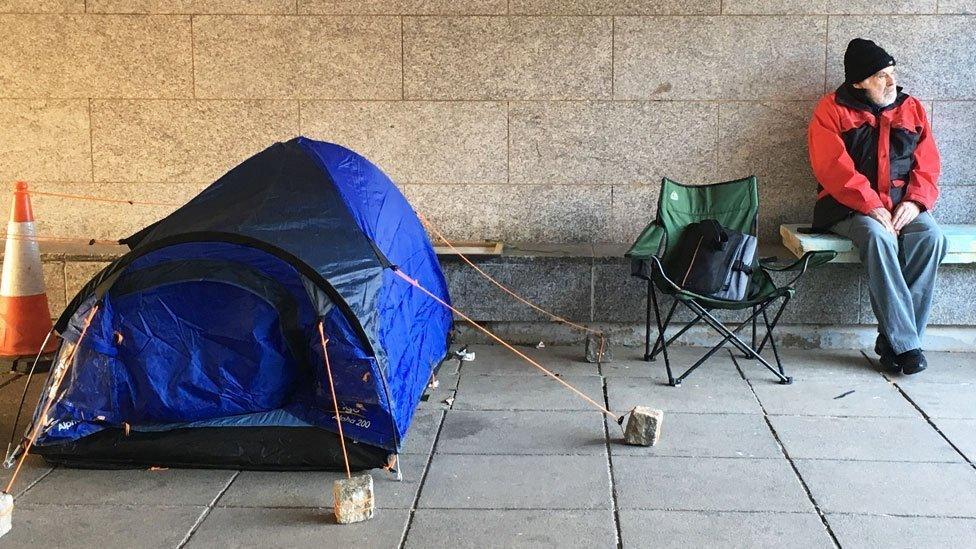
MPs are going to debate whether government spending on homelessness is effective
Parliament's Brexit phoney war continues this week, with key pieces of legislation being held back by the government. The Taxation (Cross Border Trade) Bill and the Trade Bill have both cleared their Commons committee stages, but they may now be marooned in parliamentary limbo until after Easter, while the fragmented tribes of Commons Remainers plot to attach toxic (to the government, anyway) amendments. Proposals on another key Brexit issue - immigration - float in the clouds nearby.
In the Lords, peers have barely begun their detailed scrutiny of the EU (Withdrawal) Bill, and serious attempts to amend it won't start until after Easter. So much for all the talk of Parliament being swamped by the legislative implications of the Leave vote. Instead, our lawmakers are sweeping up the last vestiges of uncontroversial measures about space ports and nuclear safeguards, and remarking to each other in the tones of a 1950s western, that it's "quiet, too quiet."
Labour's flirtation with the idea of supporting Britain establishing "a" customs union with the EU may have dramatic implications for these and other bills when they do come to the wicket. If Labour whips in favour of amendments along those lines, the government could be in trouble, and Remain Conservatives may face a painful choice between their party and their euro-principles.
But that is for the future. Next week there is a bit of novelty to divert MPs, in the form of two days of "Estimates" debates. The novel bit is that they will actually get to debate, er, the estimates, the government's detailed plans for spending taxpayers' money.
For years Estimates Days were rather strange occasions, on which the Commons would be presented with a select committee report or two to debate, before rubber stamping plans to spend billions of pounds of public money. If any MP had the temerity to stray into the substance of what they were voting on, and suggest that more might be spent on X, and less on Y, they would be ruled out of order by the chair.
For a Parliament that once fought a civil war, and indeed beheaded a king, for the right to control the public purse strings, this seemed a little feeble. And now, some deft behind the scenes re-jigging has given MPs control over the subjects to be debated on Estimates Days. They can pitch ideas for the debates to the Backbench Business Committee, which then chooses the subjects for four debates, each of three hours, spread across Monday and Tuesday, next week. It is a quiet triumph for backbench and select committee power.
The chosen subjects are spending on defence, homelessness, the Department for Exiting the EU, and transport. MPs will be able to talk about the spending plans in these areas to their hearts' content. Ministers will then have to respond and justify why, for example, various rail electrification schemes have been put on ice, or parry claims that too much infrastructure spending goes to London.
What they won't be able to do is actually change the spending plans but the hope is that the fear of a rough ride from the Commons will mean MPs can exert some leverage over ministers. We shall see.
Here's my rundown of the week ahead:
Monday 26th February
The Commons meets at 2.30 pm for Home Office Questions, and any post-weekend ministerial statements or urgent questions will normally follow from 3.30pm
Then comes the first revamped Estimates Day (see above). It is divided into two three-hour debates. The first is on the Ministry of Defence, where MPs, including the Defence Committee Chair Julian Lewis, will seek to press the Defence Secretary, Gavin Williamson, on the level of defence spending. Dr Lewis wants to see Britain spending 3 per cent of GDP, as it did until the mid 1990s, rather than the NATO minimum of 2 per cent. The threatened cuts to the Royal Marines look certain to feature, as well. (The following day, MPs will vote on authorising spending of £8,852,638,000, £1,363,500,000, and £1,703,385,000 for defence purposes.)
Next there's a debate on the estimates for DExEU - the Brexit department. This is an umbrella term for a debate on the cost of implementing Brexit, the day to day activities and the practical spending on transitional arrangements, as the Brexit process moves into a critical six months.
The adjournment debate, led by Labour's Liz McInnes, is on the future of diabetes care, treatment and prevention.
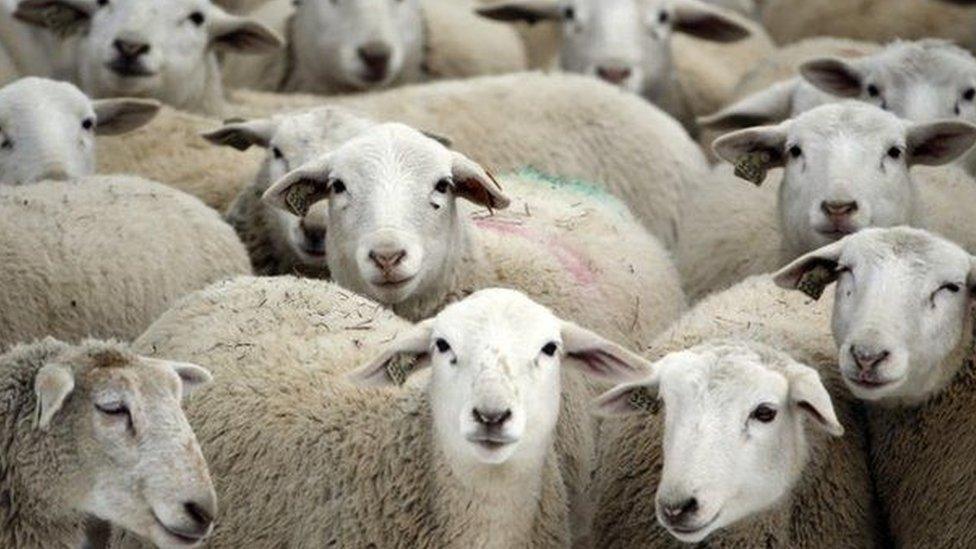
There'll be a Westminster Hall debate on ending live animal exports after Brexit
In Westminster Hall (4.30 pm) MPs debate e-petition 200205 "End the export of live farm animals after Brexit." The petition, signed by 78,884 people, says the transport of live animals exported from the UK causes immense suffering. It adds that the trade is governed by EU law, not the UK Government, and that the Government should plan legislation to ban the export of live farm animals in favour of carcass-only trade and introduce this as soon as Britain leaves the EU.
There's a bit of a rail theme on the committee corridor, with Public Accounts (4 pm) looking at rail franchising in the UK based on a report by the public spending watchdog, the National Audit Office, external, which notes an improved performance in the management of franchises, since the collapse of the West Coast Main Line competition, but highlights continuing risks over the rail infrastructure improvement programme. The Committee will explore those issues with Bernadette Kelly, the Permanent Secretary at the Department for Transport, plus witnesses from Network Rail and major franchise holders.
In the Lords (2.30 pm) peers warm up for their second day of detailed debate on the EU (Withdrawal) Bill with questions to ministers on the National Child Obesity Strategy, representations opposing electrical safety checks in the private rented housing and establishing the proposed new Northern Forest.
Then comes the European Union (Withdrawal) Bill where big Labour amendments on reciprocal health rights for British and EU citizens and on UK participation in the student exchange programme, Erasmus, are next up for debate. Peers may get to Lord Goldsmith's amendment on the Charter of Fundamental Rights.
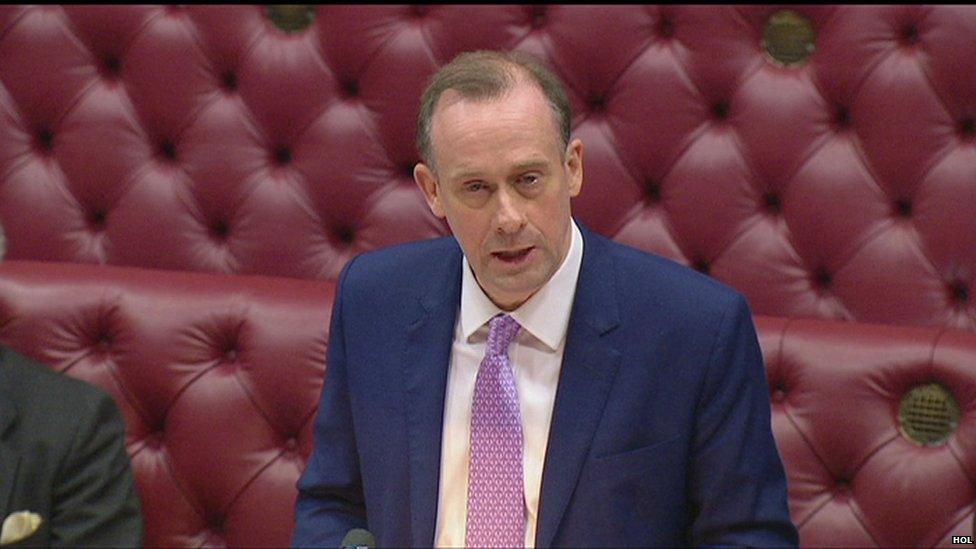
Brexit Minister Lord Callanan is regularly getting 'biffed' by members of the House of Lords
One emerging feature of these debates is the rough treatment of the Brexit minister Lord Callanan. he is regularly getting biffed by peers who accuse him of failing to answer the points they have made. Perhaps it is just the result of the debates dragging on past midnight, but he seems to be becoming a bit of a target.
Tuesday 27th February
MPs begin (11.30 am) with Treasury Questions followed by the second of the new-look Estimates Days, focussing on homelessness. This was called for by the Public Accounts Committee, in the wake of their report on homelessness, external, published last year. This should be a wide ranging debate involving several government departments, including Communities and Local Government, Work and Pensions and Health. The idea is to look at the factors driving the current rise in rough sleeping and homelessness generally. The PAC was critical of the way the government spends the £1.1 billion allocated to homelessness prevention, but the system is likely to change when the Homelessness Reduction Act comes into force in April.
The second debate will be on transport where the issue under scrutiny will be some of the government's big infrastructure decisions on rail electrification, as well as the geographical balance of the spending. Are the regions being short-changed in favour of London?
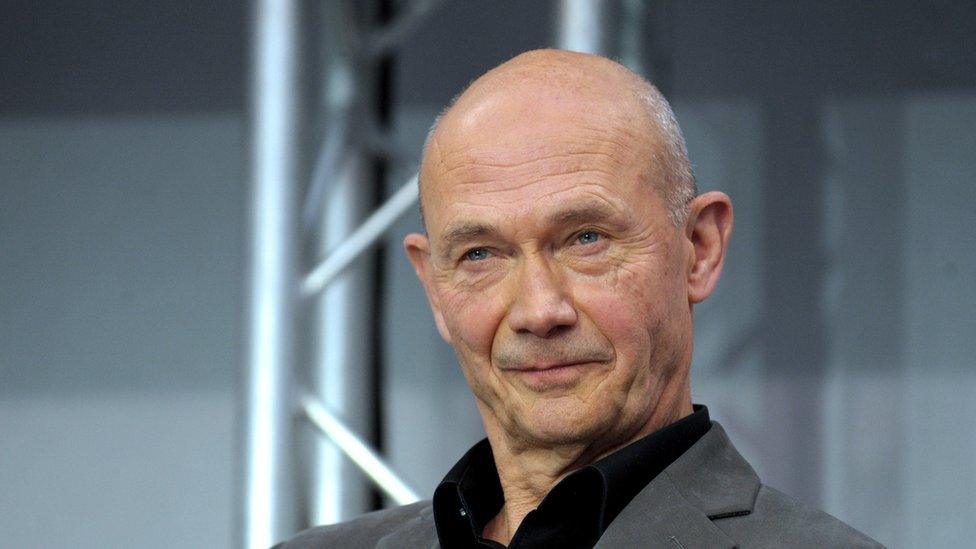
Pascal Lamy, former director-general of the World Trade Organisation, is giving evidence to the Brexit committee
My committee pick is the Brexit hearing (9.15am) with Pascal Lamy, the former Director General of the World Trade Organisation which will doubtless explore the implications of the UK trading with the EU on WTO terms, rather than with the kind of bespoke deal the government is seeking.
In the Lords (2.30 pm) question-time features what appears to be the hot new fashion among soft Brexit/Remain parliamentarians: the possibility of UK membership of the European Free Trade Agency. The Labour peer Lord Lea of Crondall, a former vice president of the European TUC, will ask if membership of EFTA could be a way of remaining in the European Single Market, post-Brexit.
Then, peers will deal with Commons amendments to the Space Industry Bill. The main change, which will probably be rubber-stamped with minimal delay, was a requirement for an environmental assessment as part of the process for licensing a space port.
Then they will turn to the detail of the Laser Misuse (Vehicles) Bill , which introduces an offence of shining or directing a laser beam towards a vehicle which dazzles or distracts the person with control of the vehicle.
Next comes the second reading of the Haulage Permits and Trailer Registration Bill - a Brexit bill which gives powers to support UK hauliers operating internationally after the UK leaves the EU. It would allow the government to set up a permit scheme for hauliers if required as part of a deal with the EU, ensuring UK hauliers can obtain the necessary paperwork to provide services to and from EU countries.
Wednesday 28th February
In the Commons (11.30 am) business begins with international development questions, with Prime Minister's Questions at noon.
The Labour MP John Mann has a Ten Minute Rule Bill to make social media service providers liable in defamation and libel actions - a major change which would have a dramatic impact on what could be published online in the UK
The main debate is on a motion on the independent complaints and grievance policy that the House authorities want to introduce. Te motion, which has cross party support, endorses the recommendations of the working group which drew up the policy and sets in train the work needed to implement it.
It includes several elements. One is drawing up a behaviour code for Parliament that covers bullying and harassment, and sexual harassment, and applies to everyone working there. There are also plans to set up the independent complaints scheme which will underpin the code, devise procedures for allegations of sexual harassment and to identify any necessary amendments to the Standing Orders of the House.
Then there's the novelty of some opposed private business. It's the report stage of the The Middle Level Bill deals with navigation issues in the Fens. Some MPs have objected to it going through without debate.
In Westminster Hall, my eye was caught by Dr Rupa Huq's debate (2.30 - 4 pm) on anti-corruption strategy and the illegal wildlife trade - focusing on the vast profits from dealing in products from endangered species, like ivory and rhino horn, and the link to money laundering.
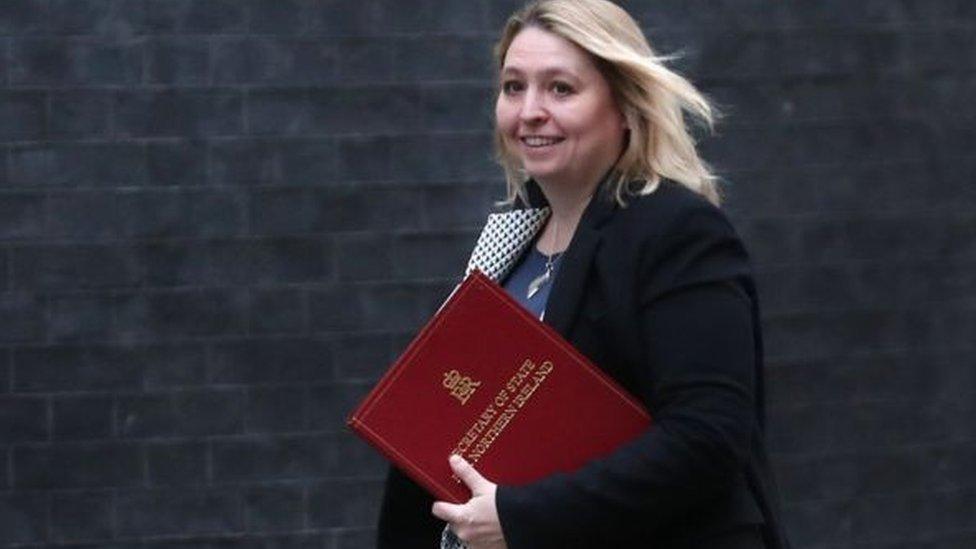
Northern Ireland Secretary Karen Bradley will face a committee session about the future of devolved government in Stormont
My committee pick is the Northern Ireland Affairs hearing (9.30am) on devolution and democracy in Northern Ireland. MPs will be asking the Northern Ireland Secretary, Karen Bradley what happens now, after the failure of attempts to reinstate devolved government. With talk in some quarters that the Good Friday Agreement, which mandates all-party coalition government in Stormont, needs to be revised, this will be a highly sensitive session.
In the Lords after question-time (3pm) peers grind on with day three of their detailed consideration of the European Union (Withdrawal) Bill. Watch out for amendments on animal sentience - perhaps one of the surprise Brexit issues. Other issues include future treatment of retained law, such as employment protections, and guidance for domestic courts
Thursday 1st March
MPs kick off (9.30 am) with transport questions, which is followed by the revival of a Commons tradition. The St David's Day debate on Welsh Affairs used to be a fixture, since it was first proposed by Megan Lloyd George in 1944, but with the advent of the Backbench Business Committee, in 2010, it was no longer a guaranteed part of the Commons calendar. Its return follows strong pressure from Welsh MPs for a chance to raise issues about Brexit, and the implications of a hard border with the Irish Republic. There is also concern that the electrified rail link to London stops at Cardiff, and at delays in giving the go-ahead to the Swansea tidal lagoon project, where a government announcement is thought to be due soon.
These are all part of the staple diet at Welsh questions, but the Labour MP Albert Owen, one of the prime movers behind the debate, wants to press the Welsh Secretary, Alun Cairns, to use his influence to make progress on all these issues.
There's an interesting-looking adjournment debate, on the future of ATMs led by the Conservative, Simon Hoare, who is worried that they are beginning to disappear from rural areas, restricting people's access to cash. He blames changes in the money paid by LINK to the operators of ATMs, and he warns that over-reliance on digital banking is misplaced in areas where broadband speed is slow and mobile coverage is patchy.
In Westminster Hall (1.30pm) the DUP's Jim Shannon leads a debate on freedom of religion and belief . He is chair of the all party parliamentary group on international freedom of religion or belief.
In the Lords (11 am) watch out for the question from Lord Sherbourne of Didsbury, the former Political Secretary to Margaret Thatcher, on the effectiveness of Police and Crime Commissioners in holding their chief constables and police forces to account.
The main debate in the Lords is the second committee stage day on the Nuclear Safeguards Bill, where the main points at key issue are freedom of movement, ONR independence and funding, and a sunset clause.
There's also a short debate on the use of facial recognition technology in security and policing, led by the Green Party's Baroness Jones of Moulsecoomb, She argues the system is flawed, gives too many false results, and is intrusive to innocent people.
She shares the view of the pressure group Big Brother Watch that "facial recognition cameras are essentially biometric checkpoints - no different to DNA or fingerprint checkpoints. They biometrically assess and check the identities of passers-by, turning us all into walking ID cards."
Neither House is sitting on Friday.